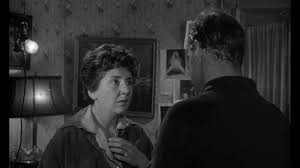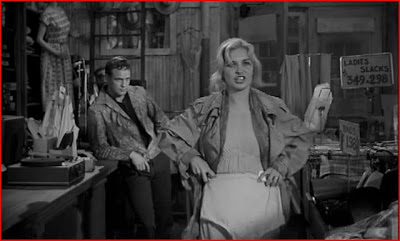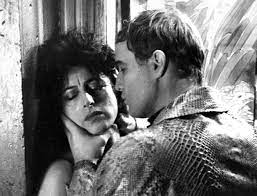A problematic play became a troubled film shoot and then a box office bomb when Tennessee Williams, Sidney Lumet, Brando and United Artists took a shot at “Orpheus Descending,” the play that became “The Fugitive Kind” back in 1960.
It’s slow, a low-simmer Southern Gothic slice of suffocating small town prejudices, sublimated desires and the trap of the “way its always been” hierarchy.
It features Marlon Brando with all his sex appeal and little of his heat or dramatic fire, Joanne Woodward at her spunkiest, a somewhat miscast Anna Magnani, with the actress who played her role on stage (Maureen Stapleton) on the set with her most days.
A happy shoot? An infamously unhappy one, according to legend. You can see it in Brando’s lack of interest, actresses insecurely over-emoting to compensate, in the leaden pacing that sets in after crackling introductory scenes.
Even the famed Williams monologues, soulful reveries of the past and dreams and genteel possibility have the life squeezed out of them by the weight of the film surrounding them.
“You might think that there’s. . .there’s many. . .many kinds of people in this world. But there’s only two kinds: The buyers and the ones that get bought. No, there’s another kind…
“It’s a kind that don’t belong no place at all. There’s a kind of bird that don’t have any legs so it can’t alight on nothing. So it has to spend its whole life on its wings in the air. I seen one, once. It died and fell to earth. And its body was light blue colored. And it was just as tiny as your little finger. And it was so light in the palm of your hand that it didn’t weigh more than a feather. And its wings spread out that wide. And you could see right through them. That’s why the hawks don’t catch them. . .because they don’t see ’em. They don’t see ’em way up in that high blue sky near the sun.”
Poetic as that is, it stops the picture cold when it’s already lurched to a crawl.
But Lumet, with his third feature film after a sterling career in Golden Age television, immerses us in a seedy, sordid and unsafe South that only Williams could dream up and only Milton, New York could recreate without the threat of cross-burnings of disapproval interrupting filming.
Brando’s a New Orleans musician, “an entertainer” with more implied in that than merely playing an autographed guitar that bluesman Leadbelly gave him. His jacket gives Val Xavier his nickname — “Snakeskin.”
We meet him in an edgy but interminable court scene, talking his way out of a long jail sentence, but also out of town. On a rainy night, he makes his exit only to break down in BFE Mississippi. A hunk like Val depends on the kindness of strangers — one in particular, the sheriff’s wife (Stapleton). She takes him in out of the rain, feeds him and hearing his mumbled wish for a fresh start, takes a stab at placing him in a job.
The owner of the town’s only store (Victor Jory) has just gotten out of a Memphis hospital. He’s unlikely to ever get back to running the place, and maybe his (unexplained Italian) wife (Magnani) could use some help.
Val first has to fend off the attention of the local hellion. Woodward’s wild, loud, liquor-swilling juke-joint-banned Carol Cutrere is as unwashed as her Jaguar XK, which she tears around two counties in, top down, pedal to the metal. The places she’s not allowed in compete with the places where she’s not allowed to drive on her rap sheet. But she’s from money, so there’s no controlling her.
And there’s no saving her, Val seems to gather. But maybe he can get her out of this or that fix just by taking the wheel, even if all she ever wants to do is go “juking.”
“That’s when you get in a car, which is preferably open in any kind of weather. And then you drink a little bit and you drive a little bit, and then you stop and you dance a little bit with a jukebox. And then you drink a little bit more and you drive a little bit more, you stop and you dance a little bit more to another juke box! And then you stop dancing and you just drink and you drive. And then, you stop driving.”
The tug of war over Val’s attentions and his very soul is him wanting to impress the mother figure, the sheriff’s wife, to rescue the unhappy-to-the-point-of-stricken Lady Torrance (Magnani), whose traumatic past includes family horrors and a frustrated affair with Carol’s ne’er do well brother (John Baragrey), and escaping his own sordid past, thrown in his face by the presence of party gal Carol.
It’ll all end in tragedy, I do declare.
Racism is introduced by the sheriff, and there has never been a better big screen bigot than character heavy R.G. Armstrong. Threats and seductions and rain and even the tiniest hopes of bringing a little refinement to this corner of muddy, redneck hell are just there to be thwarted in Tennessee Williamsland.
The stagebound film reminded me of the one time I can recall seeing it on the stage. Leave out the rain, fire and Jaguar they could have taken this version on the road, where audiences might have reveled in the star power, but not in the story, which grinds to a halt once the lights come on in that general store turned “department” store.
Brando completists still make pilgrimages to “Fugitive,” and Williams fans looking for the “first play that didn’t work” in his canon might be drawn in. This counts as a rare stumble after a decade of triumphs and Oscar-lauded screen adaptations.
Magnani’s presence is interesting to ponder in a back story Williams doesn’t provide the character. As she’s playing Lady Torrance, she must have been a war bride, the cruelty her husband visited upon her family a product of that war.
Lumet’s direction crackles in the opening act, and then the man who directed “12 Angry Men” on basically a single set finds himself at a loss in how to animate this busier set, motivate his players and keep the peace. The lighting and production design are immersive, but “The Fugitive Kind” can feel like a still life, sordid dead-end lives preserved in a muddy, beer-stained glass menagerie.
The thing that gave me the biggest kick out of belatedly getting around to this tainted “classic” is seeing, on the screen, what Paul Newman saw when he looked at Joanne Woodward. Not just the talent, but the spark and fire — sexy and funny and up for anything.
But he can’t have approved of what she and her character did to that Jaguar. That’s beyond the pale.
MPA Rating: unrated, violence, adult themes, profanity
Cast: Marlon Brando, Joanne Woodward, Anna Magnani, Victor Jory, Maureen Stapleton, R.G. Armstrong, John Baragrey and Emory Richardson
Credits: Directed by Sidney Lumet, script by Tennessee Williams and Meade Roberts, based on a play by Tennessee Williams. A United Artists release on assorted streaming platforms.
Running time: 2:01





